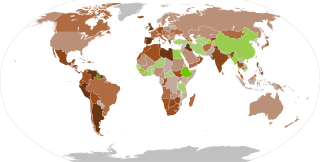Related Research Articles

In economics, a recession is a business cycle contraction that occurs when there is a general decline in economic activity. Recessions generally occur when there is a widespread drop in spending. This may be triggered by various events, such as a financial crisis, an external trade shock, an adverse supply shock, the bursting of an economic bubble, or a large-scale anthropogenic or natural disaster.

In economics, deflation is a decrease in the general price level of goods and services. Deflation occurs when the inflation rate falls below 0%. Inflation reduces the value of currency over time, but sudden deflation increases it. This allows more goods and services to be bought than before with the same amount of currency. Deflation is distinct from disinflation, a slow-down in the inflation rate, i.e. when inflation declines to a lower rate but is still positive.

In finance, the yield curve is a graph which depicts how the yields on debt instruments - such as bonds - vary as a function of their years remaining to maturity. Typically, the graph's horizontal or x-axis is a time line of months or years remaining to maturity, with the shortest maturity on the left and progressively longer time periods on the right. The vertical or y-axis depicts the annualized yield to maturity.
In finance, a dead cat bounce is a small, brief recovery in the price of a declining stock. Derived from the idea that "even a dead cat will bounce if it falls from a great height", the phrase is also popularly applied to any case where a subject experiences a brief resurgence during or following a severe decline. This may also be known as a "sucker rally".

Nouriel Roubini is a Turkish-born Iranian-American economic consultant, economist, and writer. He is a Professor Emeritus since 2021 at the Stern School of Business of New York University.
Contrarian investing is an investment strategy that is characterized by purchasing and selling in contrast to the prevailing sentiment of the time.

The "Fed model" or "Fed Stock Valuation Model" (FSVM), is a disputed theory of equity valuation that compares the stock market's forward earnings yield to the nominal yield on long-term government bonds, and that the stock market – as a whole – is fairly valued, when the one-year forward-looking I/B/E/S earnings yield equals the 10-year nominal Treasury yield; deviations suggest over-or-under valuation.
The Grand Supercycle is the longest period, or wave, in the growth of a financial market as described by the Elliott wave principle, originally conceived and formulated by Ralph Nelson Elliott. Elliott speculated that a Grand Supercycle advance had started in the United States stock market in 1857 and ran to the year 1928, but acknowledged another interpretation that it may have been the third or even the fifth Grand Supercycle wave. However, these assignments have been reevaluated and clarified using larger historical financial data sets in the works of A. J. Frost and R.R. Prechter, and the start is now considered to be 1789, when stock market data began to be recorded.

The Great Recession was a period of marked general decline observed in national economies globally, i.e. a recession, that occurred from late 2007 to 2009. The scale and timing of the recession varied from country to country. At the time, the International Monetary Fund (IMF) concluded that it was the most severe economic and financial meltdown since the Great Depression. One result was a serious disruption of normal international relations.

The US bear market of 2007–2009 was a 17-month bear market that lasted from October 9, 2007 to March 9, 2009, during the financial crisis of 2007–2009. The S&P 500 lost approximately 50% of its value, but the duration of this bear market was just below average.
Jaime Gilinski Bacal is a Colombian banker and real estate developer. Gilinski resides in London. According to Forbes, he is the second richest person in Colombia, with a net worth of US$3.6 billion as of 2020.
Recession shapes or recovery shapes are used by economists to describe different types of recessions and their subsequent recoveries. There is no specific academic theory or classification system for recession shapes; rather the terminology is used as an informal shorthand to characterize recessions and their recoveries. The most commonly used terms are V-shaped, U-shaped, W-shaped, and L-shaped recessions, with the COVID-19 pandemic leading to the K-shaped recession. The names derive from the shape the economic data – particularly GDP – takes during the recession and recovery.

Abenomics refers to the economic policies implemented by the Government of Japan led by the Liberal Democratic Party (LDP) since the December 2012 general election. They are named after Shinzō Abe, who served a second stint as Prime Minister of Japan from 2012 to 2020. Abe was the longest-serving prime minister in Japanese history. After Abe resigned in September 2020, his successor, Yoshihide Suga, has stated that his premiership will focus on continuing the policies and goals of the Abe administration, including the Abenomics suite of economic policies.

The financial crisis in Russia in 2014–2016 was the result of the sharp devaluation of the Russian rouble beginning in the second half of 2014. A decline in confidence in the Russian economy caused investors to sell off their Russian assets, which led to a decline in the value of the Russian rouble and sparked fears of a financial crisis. The lack of confidence in the Russian economy stemmed from at least two major sources. The first is the fall in the price of oil in 2014. Crude oil, a major export of Russia, declined in price by nearly 50% between its yearly high in June 2014 and 16 December 2014. The second is the result of international economic sanctions imposed on Russia following Russia's annexation of Crimea, the war in Donbas and the broader Russo-Ukrainian War.
The 2015–2016 stock market selloff was the period of decline in the value of stock prices globally that occurred between June 2015 to June 2016. It included the 2015–2016 Chinese stock market turbulence, in which the SSE Composite Index fell 43% in just over two months between June 2015 and August 2015, which culminated in the devaluation of the yuan. Investors sold shares globally as a result of slowing growth in the GDP of China, a fall in petroleum prices, the Greek debt default in June 2015, the effects of the end of quantitative easing in the United States in October 2014, a sharp rise in bond yields in early 2016, and finally, in June 2016, the 2016 United Kingdom European Union membership referendum, in which Brexit was voted upon.
David Woo is the CEO of David Woo Unbound, a global forum devoted to the promotion of fact-based debates about markets, politics, and economics. Woo was previously the Head of Global Interest Rates, Foreign Exchange, Emerging Market Fixed Income & Economics Research at Bank of America, where he researched the world financial markets. Woo is known for his contrarian calls on the 2016 United States elections, the 2015 devaluation of the renminbi, Bitcoin, and the future of the Euro. He was voted as one of the twelve smartest people on Wall Street in 2013 by Business Insider.
The 1994 bond market crisis, or Great Bond Massacre, was a sudden drop in bond market prices across the developed world. It began in Japan and the United States (US), and spread through the rest of the world. After the recession of the early 1990s, historically low interest rates in many industrialized nations preceded an unexpectedly volatile year for bond investors, including those that held on to mortgage debts. Over 1994, a rise in rates, along with the relatively quick spread of bond market volatility across international borders, resulted in a mass sell-off of bonds and debt funds as yields rose beyond expectations. This was especially the case for instruments with comparatively longer maturities attached. Some financial observers argued that the plummet in bond prices was triggered by the Federal Reserve's decision to raise rates by 25 basis points in February, in a move to counter inflation. At about $1.5 trillion in lost market value across the globe, the crash has been described as the worst financial event for bond investors since 1927.

Economic turmoil associated with the COVID-19 pandemic has had wide-ranging and severe impacts upon financial markets, including stock, bond, and commodity markets. Major events included a described Russia–Saudi Arabia oil price war, which after failing to reach an OPEC+ agreement resulted in a collapse of crude oil prices and a stock market crash in March 2020. The effects upon markets are part of the COVID-19 recession and are among the many economic impacts of the pandemic.

The COVID-19 recession is an ongoing global economic recession caused by the COVID-19 pandemic. The recession began in most countries in February 2020. After a year of global economic slowdown that saw stagnation of economic growth and consumer activity, the COVID-19 lockdowns and other precautions taken in early 2020 drove the global economy into crisis. Within seven months, every advanced economy had fallen to recession.

The expression "everything bubble" refers to the correlated impact of monetary easing by the Federal Reserve on asset prices in most asset classes, namely equities, housing, bonds, many commodities, and even exotic assets such as cryptocurrencies and SPACs. The term is related to the Fed put, being the tools of direct and indirect quantitative easing that the Fed used to execute the monetary easing, and to modern monetary theory, which advocates the use of such tools, even in non-crisis periods, to create economic growth through asset price inflation. The term first came in use during the chair of Janet Yellen, but it is most associated with the subsequent chair of Jerome Powell, and the 2020–2021 period of the coronavirus pandemic.
References
- ↑ Gaskins, Brandy (August 10, 2021). "Chargify Appoints New Chief Revenue Officer".
- 1 2 3 "Brickell Analytics LLC's CEO Isaac Gilinski Warns Investors to Prepare for a 4 Year Bear Market". EconoTimes. January 27, 2021.
- ↑ Fontevecchia, Agustino. "Colombian Banking Star Gilinski Joins The Ranks Of The Uber Rich". Forbes.
- ↑ Alexander, Dan. "Inside The Most Audacious Real Estate Project In The World". Forbes.
- ↑ "Work". April 11, 2018.
- ↑ "Chart Lovers Are Citing These Signs to Predict a Rally in Stocks". BNN Bloomberg. May 8, 2018.
- ↑ "RISING YIELD DEFLATION".
- ↑ "Isaac Gilinski" (PDF).
- 1 2 3 "Isaac Gilinski".
- ↑ "Detail by Entity Name". sunbiz.org.
- ↑ Perkins, Krystal (March 17, 2019). "Isaac Gilinski Explains How Brickell Analytics Successfully Predicted the Decline of the Australian Dollar". Prague Post.
- ↑ Treadgold, Tim. "George Soros Reported To Be Shorting The Aussie Dollar". Forbes.
- ↑ "Chart Lovers Cite Bullish Signals to Predict Rally in Stocks". Bloomberg. 8 May 2018.